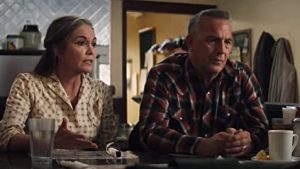Losing an adult child is one of the hardest things a parent can go through. When their son, James, dies in an accident, Margaret and George Blackledge (Diane Lane and Kevin Costner) are understandably bereft. They still have their grandson, Jimmy, and James’ widow, Lorna, so the family remains somewhat intact — at least until Lorna remarries. The Blackledges are not fond of her new husband, Donnie Weboy, but at least they can spend some time with Jimmy.
Not for long.
Margaret goes into town and sees Donnie hitting Jimmy and Lorna. She goes home to tell George, asserting that they have to get Jimmy away from his new stepfather, but George (an ex-sheriff) says there’s nothing he can do about it. Margaret won’t take that as an answer, so she goes to confront Donnie, but finds an empty apartment — they’ve skipped town. Margaret is determined to find them, and convinces George to drive with her from Montana to North Dakota, where the Weboy family lives. It’s never made clear exactly how Margaret plans to get Jimmy back, but the scene is set for a confrontation.
That comes in a face-to-face with Blanche (Lesley Manville), the overpowering Weboy matriarch, who has no intention of giving up Jimmy. She’s backed by her adult sons, who look and act like they wouldn’t flinch from a fight with the hillbillies of “Deliverance.” The conflict only escalates from there, with Margaret insisting she won’t back down, Blanche giving no quarter, and George remaining outwardly laconic while something starts to boil within.
Lane plays Margaret as a woman who’s lived her whole life in wide open spaces, happy to be a mother, grandmother, and wife. Costner plays George as a world-weary ex-lawman who has seen too much and just wants to enjoy his ranch and horses in peace. Manville, on the other hand, chews the scenery in all three of her big scenes as Blanche, acting like a mama grizzly bear furiously determined to keep interlopers away from her cub.
Director Thomas Bezucha, who adapted the screenplay from Larry Watson’s novel, understands that there’s more drama in enclosed spaces (a car, a kitchen, a motel room) than in the vast outdoors the characters travel through. Though he injects a young Native American boy the Blackledges encounter to soften the drama, Bezucha keeps the focus on the intensity of his female leads.
“Let Him Go” is not a great movie. Its weakness lies in a couple of scenarios that could come straight from a Liam Neeson revenge picture, complete with stereotypical villain acts and the requisite calm-before-the-storm moments.
Still, I found it worthwhile enough to rate it a 6.5 out of 10.

